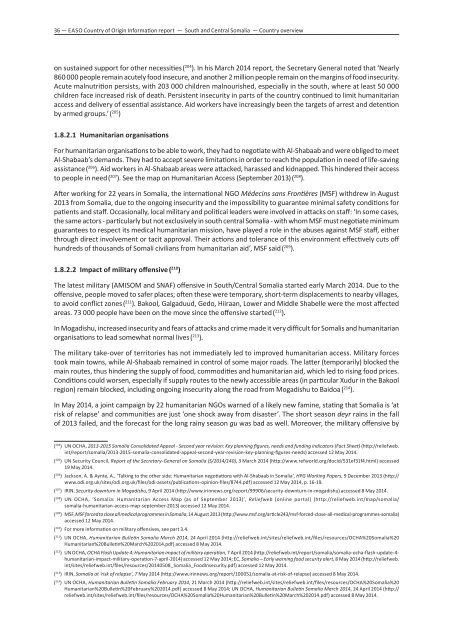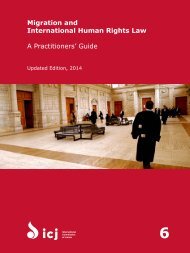You also want an ePaper? Increase the reach of your titles
YUMPU automatically turns print PDFs into web optimized ePapers that Google loves.
36 — EASO Country of Origin Information report — South and Central <strong>Somalia</strong> — Country overview<br />
on sustained support for other necessities ( 204 ). In his March 2014 report, the Secretary General noted that ‘Nearly<br />
860 000 people remain acutely food insecure, and another 2 million people remain on the margins of food insecurity.<br />
Acute malnutrition persists, with 203 000 children malnourished, especially in the south, where at least 50 000<br />
children face increased risk of death. Persistent insecurity in parts of the country continued to limit humanitarian<br />
access and delivery of essential assistance. Aid workers have increasingly been the targets of arrest and detention<br />
by armed groups.’ ( 205 )<br />
1.8.2.1 Humanitarian organisations<br />
For humanitarian organisations to be able to work, they had to negotiate with Al‐Shabaab and were obliged to meet<br />
Al‐Shabaab’s demands. They had to accept severe limitations in order to reach the population in need of life‐saving<br />
assistance ( 206 ). Aid workers in Al‐Shabaab areas were attacked, harassed and kidnapped. This hindered their access<br />
to people in need ( 207 ). See the map on Humanitarian Access (September 2013) ( 208 ).<br />
After working for 22 years in <strong>Somalia</strong>, the international NGO Médecins sans Frontières (MSF) withdrew in August<br />
2013 from <strong>Somalia</strong>, due to the ongoing insecurity and the impossibility to guarantee minimal safety conditions for<br />
patients and staff. Occasionally, local military and political leaders were involved in attacks on staff: ‘In some cases,<br />
the same actors - particularly but not exclusively in south central <strong>Somalia</strong> - with whom MSF must negotiate minimum<br />
guarantees to respect its medical humanitarian mission, have played a role in the abuses against MSF staff, either<br />
through direct involvement or tacit approval. Their actions and tolerance of this environment effectively cuts off<br />
hundreds of thousands of Somali civilians from humanitarian aid’, MSF said ( 209 ).<br />
1.8.2.2 Impact of military offensive ( 210 )<br />
The latest military (AMISOM and SNAF) offensive in South/Central <strong>Somalia</strong> started early March 2014. Due to the<br />
offensive, people moved to safer places; often these were temporary, short‐term displacements to nearby villages,<br />
to avoid conflict zones ( 211 ). Bakool, Galgaduud, Gedo, Hiiraan, Lower and Middle Shabelle were the most affected<br />
areas. 73 000 people have been on the move since the offensive started ( 212 ).<br />
In Mogadishu, increased insecurity and fears of attacks and crime made it very difficult for Somalis and humanitarian<br />
organisations to lead somewhat normal lives ( 213 ).<br />
The military take‐over of territories has not immediately led to improved humanitarian access. Military forces<br />
took main towns, while Al‐Shabaab remained in control of some major roads. The latter (temporarily) blocked the<br />
main routes, thus hindering the supply of food, commodities and humanitarian aid, which led to rising food prices.<br />
Conditions could worsen, especially if supply routes to the newly accessible areas (in particular Xudur in the Bakool<br />
region) remain blocked, including ongoing insecurity along the road from Mogadishu to Baidoa ( 214 ).<br />
In May 2014, a joint campaign by 22 humanitarian NGOs warned of a likely new famine, stating that <strong>Somalia</strong> is ‘at<br />
risk of relapse’ and communities are just ‘one shock away from disaster’. The short season deyr rains in the fall<br />
of 2013 failed, and the forecast for the long rainy season gu was bad as well. Moreover, the military offensive by<br />
( 204 ) UN OCHA, 2013-2015 <strong>Somalia</strong> Consolidated Appeal - Second year revision: Key planning figures, needs and funding indicators (Fact Sheet) (http://reliefweb.<br />
int/report/somalia/2013-2015-somalia‐consolidated‐appeal‐second‐year‐revision‐key‐planning‐figures‐needs) accessed 12 May 2014.<br />
( 205 ) UN Security Council, <strong>Report</strong> of the Secretary‐General on <strong>Somalia</strong> (S/2014/140), 3 March 2014 (http://www.refworld.org/docid/531ef31f4.html) accessed<br />
19 May 2014.<br />
( 206 ) Jackson, A. & Aynte, A., ‘Talking to the other side: Humanitarian negotiations with Al‐Shabaab in <strong>Somalia</strong>’, HPG Working Papers, 9 December 2013 (http://<br />
www.odi.org.uk/sites/odi.org.uk/files/odi‐assets/publications‐opinion‐files/8744.pdf) accessed 12 May 2014, p. 16-19.<br />
( 207 ) IRIN, Security downturn in Mogadishu, 9 April 2014 (http://www.irinnews.org/report/99906/security‐downturn‐in‐mogadishu) accessed 8 May 2014.<br />
( 208 ) UN OCHA, ‘<strong>Somalia</strong>: Humanitarian Access Map (as of September 2013)’, Reliefweb [online portal] (http://reliefweb.int/map/somalia/<br />
somalia‐humanitarian‐access‐map‐september-2013) accessed 12 May 2014.<br />
( 209 ) MSF, MSF forced to close all medical programmes in <strong>Somalia</strong>, 14 August 2013 (http://www.msf.org/article243/msf‐forced‐close‐all‐medical‐programmes‐somalia)<br />
accessed 12 May 2014.<br />
( 210 ) For more information on military offensives, see part 3.4.<br />
( 211 ) UN OCHA, Humanitarian Bulletin <strong>Somalia</strong> March 2014, 24 April 2014 (http://reliefweb.int/sites/reliefweb.int/files/resources/OCHA%20<strong>Somalia</strong>%20<br />
Humanitarian%20Bulletin%20March%202014.pdf) accessed 8 May 2014.<br />
( 212 ) UN OCHA, OCHA Flash Update 4: Humanitarian impact of military operation, 7 April 2014 (http://reliefweb.int/report/somalia/somalia‐ocha‐flash‐update-4-<br />
humanitarian‐impact‐military‐operation-7-april-2014) accessed 12 May 2014; EC, <strong>Somalia</strong> – Early warning food security alert, 8 May 2014 (http://reliefweb.<br />
int/sites/reliefweb.int/files/resources/20140508_<strong>Somalia</strong>_FoodInsecurity.pdf) accessed 12 May 2014.<br />
( 213 ) IRIN, <strong>Somalia</strong> at ‘risk of relapse’, 7 May 2014 (http://www.irinnews.org/report/100051/somalia‐at‐risk‐of‐relapse) accessed 8 May 2014.<br />
( 214 ) UN OCHA, Humanitarian Bulletin <strong>Somalia</strong> February 2014, 21 March 2014 (http://reliefweb.int/sites/reliefweb.int/files/resources/OCHA%20<strong>Somalia</strong>%20<br />
Humanitarian%20Bulletin%20February%202014.pdf) accessed 8 May 2014; UN OCHA, Humanitarian Bulletin <strong>Somalia</strong> March 2014, 24 April 2014 (http://<br />
reliefweb.int/sites/reliefweb.int/files/resources/OCHA%20<strong>Somalia</strong>%20Humanitarian%20Bulletin%20March%202014.pdf) accessed 8 May 2014.



